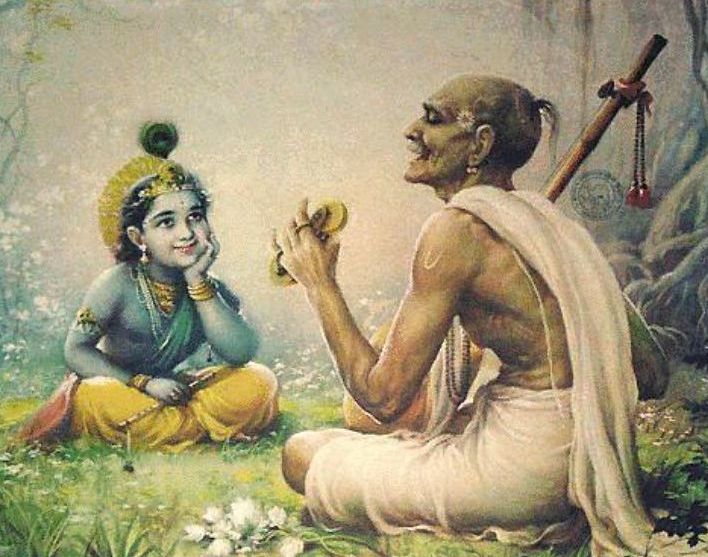
This essay is on Developing Your Love for God Through the Process of Sadhana Bhakti. As I don’t yet have love for God, this is a bit like me giving a class on Formula One Motor Racing when I don’t even have a driver’s licence. However, as I have two bona fide spiritual masters, I do at least have some theoretical understanding of this topic which I will try and share with you.
Firstly, what is Sadhana Bhakti? Sadhana Bhakti means devotional service in practice. That is, a series of activities that we can practice which will, if carried out carefully, have the effect of purifying our heart and mind and re-establishing us in the natural condition of the soul. The natural condition of the soul is to be situated in pure, unconditional love for the Supreme Soul, Lord Sri Krishna. This is called Bhakti Yoga, or the loving union of the individual soul with the Supreme Soul.
When transcendental devotional service, by which love for Krishna is attained, is executed by the senses, it is called Sadhana-Bhakti, or the regulative discharge of devotional service. Such devotion eternally exists within the heart of every living entity. The awakening of this eternal devotion is the potentiality of devotional service in practice.
[Caitanya-caritamrta Madhya 22:105]
Purport by Srila Bhaktivedanta Swami Prabhupad:
This verse is found in the Bhakti-rasamrta-sindhu [1:2:2]. Because living entities are minute atomic parts and parcels of the Lord, devotional service is already present within them in a dormant condition. Devotional service begins with sravana kirtan – hearing and chanting. When a man is sleeping, he can be awakened by sound vibration; therefore every conditioned soul should be given the chance to hear the Hare Krishna mantra chanted by a pure Vaisnava. One who hears the Hare Krishna mantra thus vibrated is awakened to spiritual consciousness, or Krishna consciousness. In this way one’s mind gradually becomes purified, as stated by Sri Caitanya Mahaprabhu [ceto-darpana-marjanam]. When the mind is purified, the senses are also purified. Instead of using the senses for sense gratification, the awakened devotee employs the senses in the transcendental loving service of the Lord. This is the process by which dormant love for Krishna is awakened.
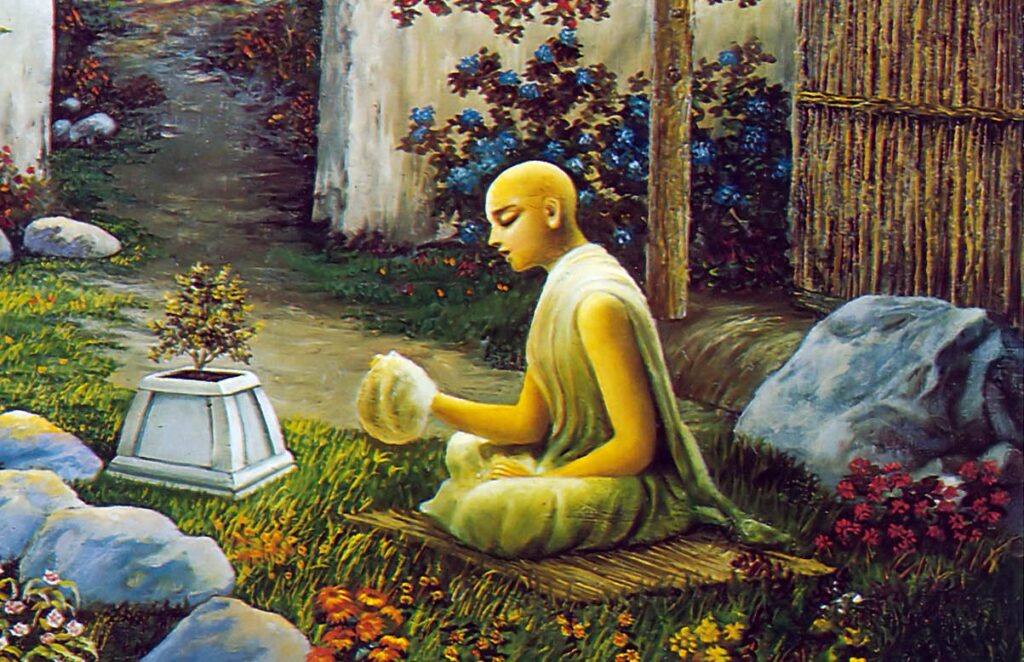
Devotional service to Krishna can be divided into three categories: Devotional Service in Practice, Devotional Service in Ecstasy, and Devotional Service in Pure Love of God. Devotional Service in Pure Love of God means that out of an extreme condition of selfless love for Krishna we are motivated to work for His pleasure. The soul is eternally an individual person. It is just a matter of perfecting that individuality by directing it into loving exchanges with the Supreme Soul. This loving service in its perfected state is undivided, unconditional and uninterrupted. God can only be attained by the redevelopment of the soul’s eternal love for Krishna.
My dear Arjuna, only by undivided devotional service can I be understood as I am, standing before you, and can thus be seen directly. Only in this way can you enter into the mysteries of My understanding.
[Bhagavad-gita 11: 53]
Always think of Me and become My devotee. Worship Me and offer your homage unto Me. Thus you will come to Me without fail. I promise you this because you are My very dear friend.
[Bhagavad-gita 18:65]
O son of Prtha, those who are not deluded, the great souls, are under the protection of the divine nature. They are fully engaged in devotional service because they know Me as the Supreme Personality of Godhead, original and inexhaustible. Always chanting My glories, endeavoring with great determination, bowing down before Me, these great souls perpetually worship Me with devotion.
[Bhagavad-gita 9:13-14]

Love and Lust
So, what is this love for God? Is it like what we call love in the material world? Generally, in the material world what is known as “love” is actually lust. Love means that I only care for the well-being of the one I love. It is totally selfless. “Lust” means that I see others as things that I can use to derive pleasure for myself. It is totally selfish. And it is the nature of lust that it is temporary. Lust is actually a transformation of our original love for the Supreme Soul. When, due to being infected by enviousness we desire to be number one, the supreme enjoyer, we come to this world and our natural loving propensity is selfishly directed towards matter. This is lust. The more we love matter the less we are able to love God and other souls. And the more we are re-established in our original condition of love, the less we love matter. Lust and love, although confused in this world, are actually mutually exclusive. One cancels out the other.

There is a song by the Australian songwriter Paul Kelly, called “When I First Met Your Ma.” It is sung to Kelly’s son, and describes how he first met his first wife. He was playing in his band in a pub and he sees this beautiful lady and falls head over heels. They have a whirlwind romance, get married and have kids etc. But the satisfaction doesn’t last, and the chorus of the song goes:
Love like a bird flies away. You’ll find out, the only way. Love like a bird flies away.

But real love is eternal. It doesn’t fly away. If it ends it wasn’t love. My so-called “love” for someone else will dry up or turn to anger or even hatred if I no longer get what I want. When someone in our society is murdered, generally the prime suspect and first person investigated is the spouse or partner. Most murders are carried out by someone who at one time thought that they loved the other person. When two people meet, they want to get satisfaction from each other. This ends up with anger. The reason of this is described in Bhagavad-gita [2:62]. Lord Krishna says:
While contemplating the objects of the senses, a person develops attachment for them, and from such attachment lust develops, and from lust anger arises.

Under the influence of lust, we lose control. “I need to have this person!” It is all done to satisfy our lust. But this doesn’t work because the soul actually craves spiritual love and therefore our lust cannot be satisfied – it constantly redirects to someone or something else.
Selective Love
Another thing about so-called love in this world is that it is selective. The most selfish, narcissistic person cares only for himself. A little less selfish is the person who “loves” his own family but doesn’t care for others. You see in movies like the Godfather how the Mafiosi guys are really into their families but they don’t have great concern for the well-being of others. Then you have the person who loves his state or nation but doesn’t care for those in other states or nations. For instance, a few years back there was a tsunami in Thailand and nearly 230,000 people died. The Courier Mail had headlines like: “Three Queenslanders Die in Tsunami.” They may as well have written: “Who gives a rat’s arse about all the other foreigners who died. They weren’t important because they weren’t Queenslanders.”
This is selective love. Even humanitarians don’t care so much for all of the trillions of souls in other bodies – plants, animals, fish, birds etc. Real love is only possible when we love Krishna. Then we will naturally love all of His children. Love for Krishna includes love for all living entities. And if we are cruel and hateful towards any of Krishna’s children our attempts to develop love for Krishna will be stifled. It is like trying to build a fire and at the same time pouring water on it. Love for Krishna is all inclusive – there is no discrimination, hate, envy etc. in the heart of a pure devotee. The devotee only acts out of compassion and kindness towards others, and he is the well-wisher of all living entities:
… Those who are actually devotees are broad-minded, equal to everyone and very peaceful. They never become angry, and they are friendly to all living entities.
[Srimad Bhagavatam 5:5:2 and Caitanya-caritamrta Madhya 22:82]
My dear sons, you should not envy any living being – be he moving or non-moving. Knowing that I am situated in them, you should offer respect to all of them at every moment. In this way you offer respect to Me.
[Srimad Bhagavatam 5:5:26]

Passing Sentiment
Another thing that is important to understand is that love is different from passing sentiment. For example, due to someone’s addiction to hard drugs like heroin or “ice” [meth amphetamines] there may not be enough money to properly feed, clothe and house the addict’s children. They may live in a household that’s filled with hardship, poverty, tension and violence due to the selfish compulsion of the addict. Yet if Child Safety Services try to take these children away the parent will invariably cry and say, “I love my children.” But this is not actually love, it is passing sentiment. If this person actually loved his or her children, they would make sacrifices to look after them properly. Love is not just a sentiment or emotion that one feels. Love is practical. It means caring enough to be motivated to do what is necessary to look after the well-being of the one you love. Love involves selflessness and sacrifice. Sentiment alone can be displayed by the most selfish person. In love we work for the satisfaction and pleasure of the one we love. The ecstasy of a great saintly person is a product of their feelings of love for the Supreme Soul and all other souls.
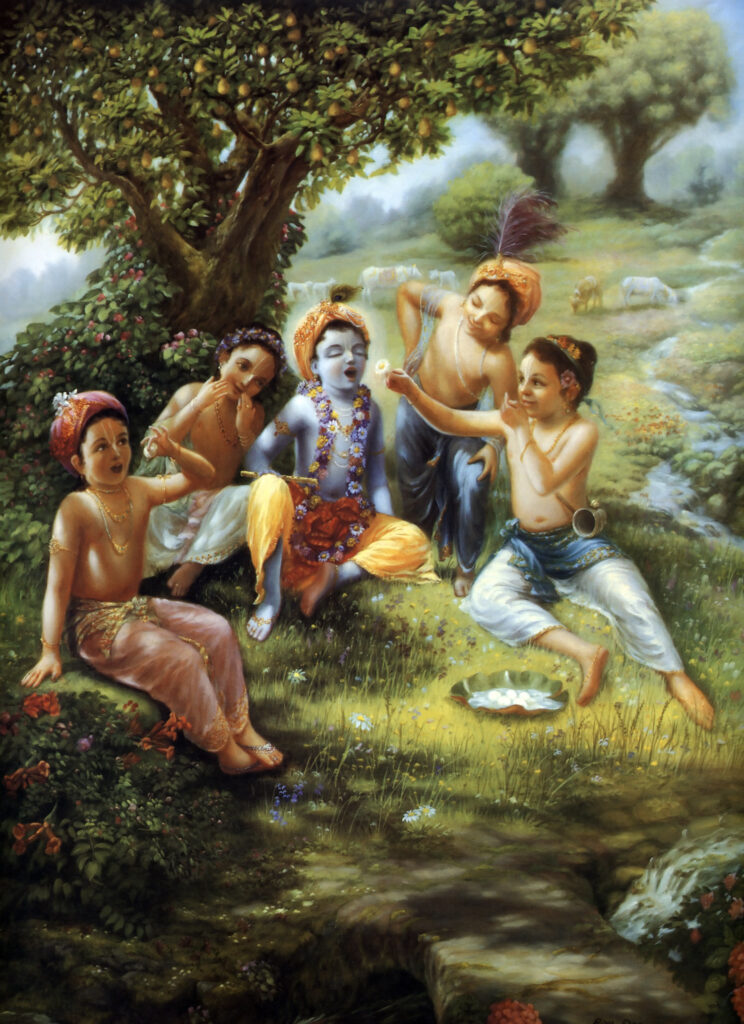
Love is Unconditional
Another characteristic of pure devotional service is that it is unconditional. Unconditional means “without conditions or limitations, absolute and complete.” Sometimes when we go to purchase an advertised product there is a little disclaimer at the end, saying “terms and conditions apply.” This is usually referred to as the “fine print” – it is generally just barely readable because the advertiser doesn’t really want us to know the “catch” in the deal – perhaps he is advertising apples for ten cents, but in the conditions of the sale there is a limit of one apple per customer at the sale price. Or he is selling skateboards at unbelievably low prices, but the fine print reads, “Sale price only available to senior citizens.” So basically, they may be offering something that isn’t all that it’s cracked up to be. The generosity of the offer is limited by certain conditions.

Unconditional love is known as “affection without any limitations.” It is that type of love which has no bounds and is unchanging. In conditional “love,” the “love” is earned on the basis of conscious or unconscious conditions being met by the lover, whereas in unconditional love, love is given freely to the loved one “no matter what.” Conditional love requires some kind of finite exchange, whereas unconditional love is infinite and measureless. In the material world, the closest we come to real unconditional love is altruism – selfless service to others’ physical and perhaps psychological needs, or a mother’s love for her child.

In the case of a mother’s love, many believe this is the perfection of unconditional love in this world. A cruel psychopathic serial killer like Ivan Milat will still be visited in jail by his mother who – despite all the evidence to the contrary – still believes her son to be innocent – “My Ivan’s always been a good boy.” No matter how her son acts, such a mother will always stand by him, insisting on his innocence, or making excuses for his heinous crimes. “Poor Ivan had such a sad childhood – the little darling just adored animals but he was so unlucky – all of his pets died one after another. We couldn’t understand it! Horrible deaths, one after the other!”
However, if the mother is not blinded by her so-called love, and is able to accept the truth, her love will not be so perfect. There is a saying, “Love is blind.” In other words, such love is limited by the condition of ignorance – the mother is in denial, she chooses to ignore the obvious facts. And once Mum dies, the relationship ends. Mother and son may be born again but have no connection with each other beyond the grave. The relationship is not eternal – it is also conditioned by false bodily identification.
There is a story that Srila Bhaktivedanta Swami used to tell, about a cobbler who had a few sons who were very devoted to their father. The father, after many years of hard work, had built up a profitable business, employing all of his sons. When the old cobbler died his sons were full of grief. They carried on the family business, and the father reincarnated in the same town as his sons. When he grew up, the former father became a homeless beggar, and sought charity from the cobbler’s shop run by his sons. The sons threw their former father out onto the street, and chucked old shoes at him.
The point is that in the material world, so called love is tinged with skin disease – we may have attachment to our family members but not care for others. This so-called love is simply based on the bodily relationship – it has not expanded to include all of mankind, let alone all living entities. It does not continue after the grave, so it is not absolute, it is not eternal.
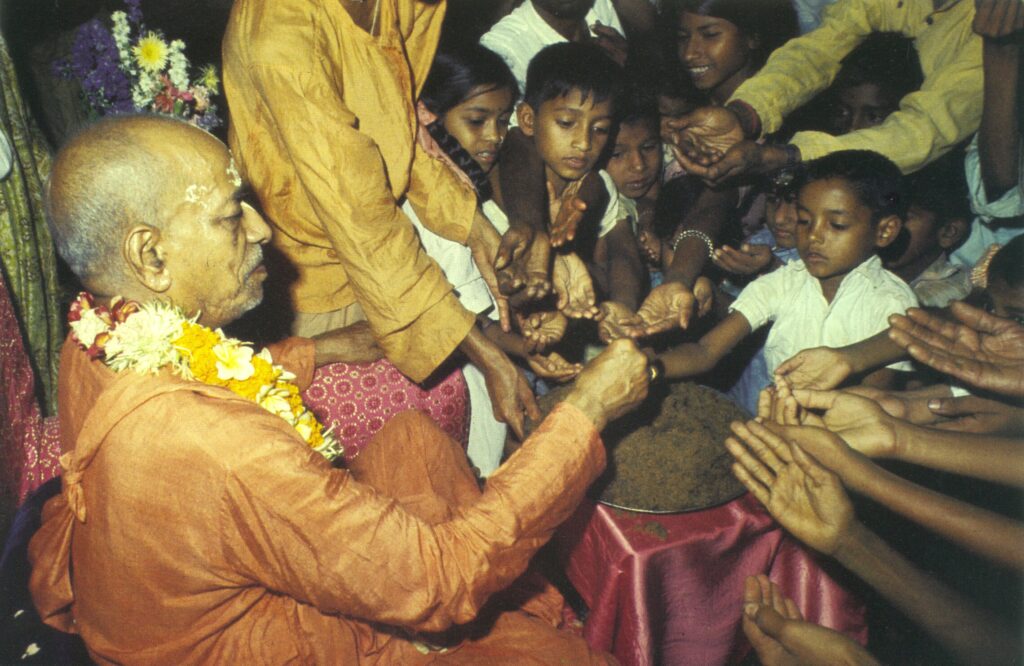
The unconditional love God and His pure representative have for all of God’s children does not entail or depend upon any ignorance. They know all the facts, and they love each of us anyway. It is sometimes said that “God loves the sinner but hates the sin.” Krishna and His perfect devotee see all our faults, our fallen material condition, but they love us anyway. They know us for who we really are – they see our swarup – our eternal spiritual identity which is only temporarily covered by ignorance. The love of God and His pure devotees is perfect, absolute, eternal and unconditional.
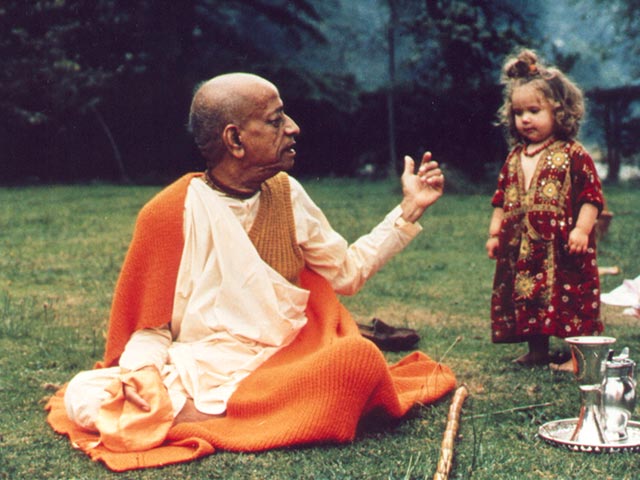
And the same qualities are found in the love that the perfect, fully surrendered soul has for Krishna. Such love is also without conditions or limitations, and is unmotivated – not polluted by any desire for reward or payment – there are no catches, no fine print, no conditions. Only by being granted the vision to see into the heart of Krishna’s pure devotee can we understand such perfect selfless love. When we experience the devotee’s unconditional and undeserved love for us, then we are given a glimpse of the standard of love required to be an actual lover of God. In Lord Chaitanya’s Eighth Prayer we find the perfect standard for unconditional love:
I know no one but Krishna as my Lord, and He shall remain so even if He handles me roughly by His embrace or breaks my heart by not being present before me. He is completely free to do anything and everything, but He is always my worshipful Lord, unconditionally.
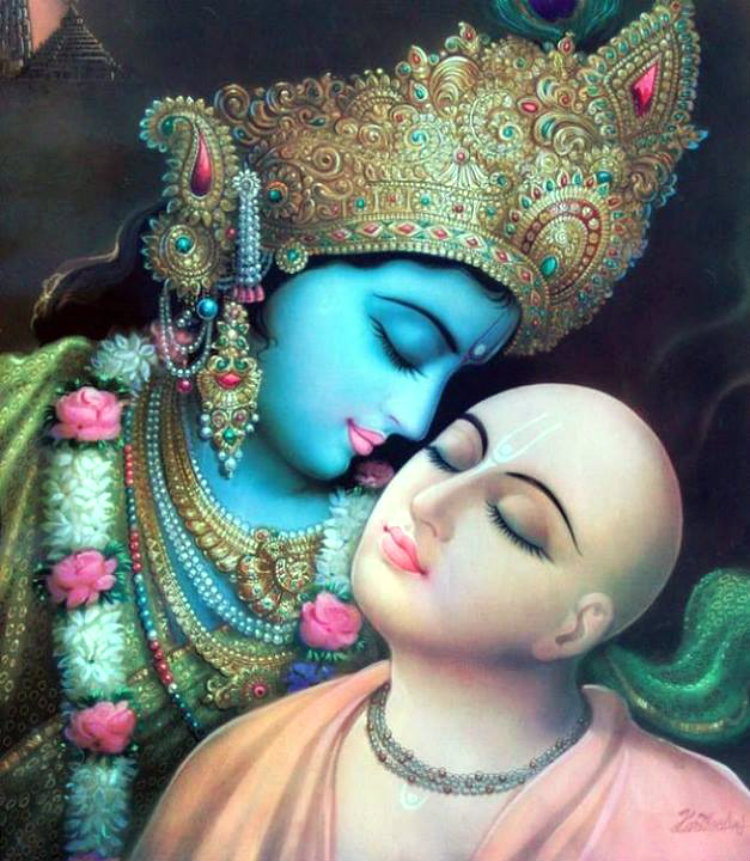
The supreme occupation for all humanity is that by which men can attain to loving devotional service unto the transcendent Lord. Such devotional service must be unmotivated and uninterrupted to completely satisfy the self.
[Srimad Bhagavatam 1:2:6]
Devotional Service in Practice
So how does one awaken this unconditional love for the Supreme Soul that is lying dormant within our heart. It is by the process of sadhana bhakti – devotional service in practice. There are nine processes of devotional service described by Prahlad Maharaj in the Srimad Bhagavatam:
Prahlada Maharaja said: Hearing and chanting about the transcendental holy name, form, qualities, paraphernalia and pastimes of the Lord, remembering them, serving the lotus feet of the Lord, offering the Lord respectful worship with sixteen types of paraphernalia [deity worship], offering prayers to the Lord, becoming His servant, considering the Lord one’s best friend, and surrendering everything unto Him (in other words, serving Him with the body, mind and words) – these nine processes are accepted as pure devotional service. One who has dedicated his life to the service of Krishna through these nine methods should be understood to be the most learned person, for he has acquired complete knowledge.
[Srimad Bhagavatam 7:5:23-24]
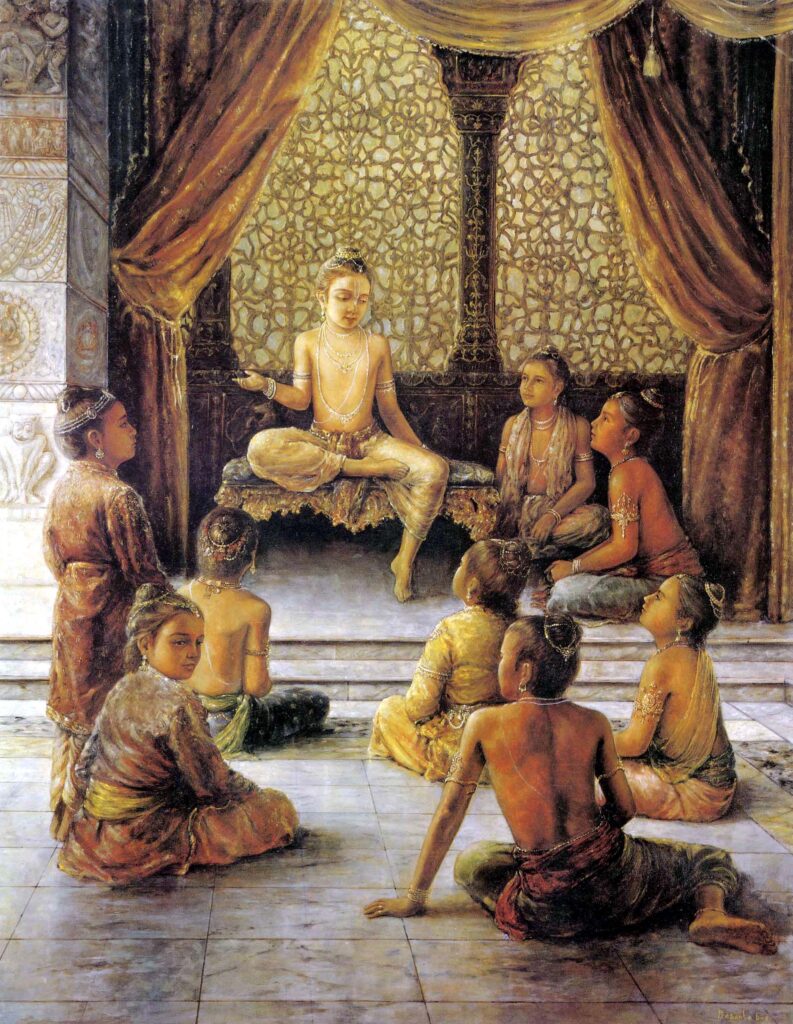
Of these nine processes of devotional service, sravanam [hearing] and kirtanam [chanting] of the holy names and words of the Supreme Lord are considered to be the most important, and they form the basis for all other forms of devotional service. Hearing refers to the Holy Names and spiritual knowledge – the words and instructions of a bona fide spiritual master and other saintly teachers past and present, as well as hearing scripture. This is the foundation upon which our spiritual life is built. The spiritual master is the direct representative of the Lord and as such his instructions are non-different from those of the Lord. He does not deviate from the version of the authorized scriptures or his predecessor acaryas. Narottama Dasa Thakura states:
Making the words of the guru, sadhus, and shastras one with my heart, I constantly float and swim in the ocean of pure love.
[Prema-bhakti-candrika 1:9]

Hearing and chanting are most potent in re-establishing pure love of God within the heart of the devotee, thereby extinguishing the blazing fire of material existence. Especially in this age of Kali yuga, the process of chanting the Lord’s Holy Names is given great prominence. This message is stated repeatedly throughout the Vedic yoga texts and taught by innumerable great saintly teachers. The importance of this chanting process in the present very materialistic age of Kali Yuga is made very clear in the Srimad Bhagavatam:
My dear King, although Kali-yuga is an ocean of faults, there is still one good quality about this age: Simply by chanting the Hare Krishna maha-mantra, one can become free from material bondage and be promoted to the transcendental kingdom.
[Srimad Bhagavatam 12:3:51]
The religious practice for the age of Kali is to broadcast the glories of the holy name. Only for this purpose has the Lord, in a yellow colour, descended as Lord Chaitanya.
[Caitanya-caritamrta Adi 3:40]
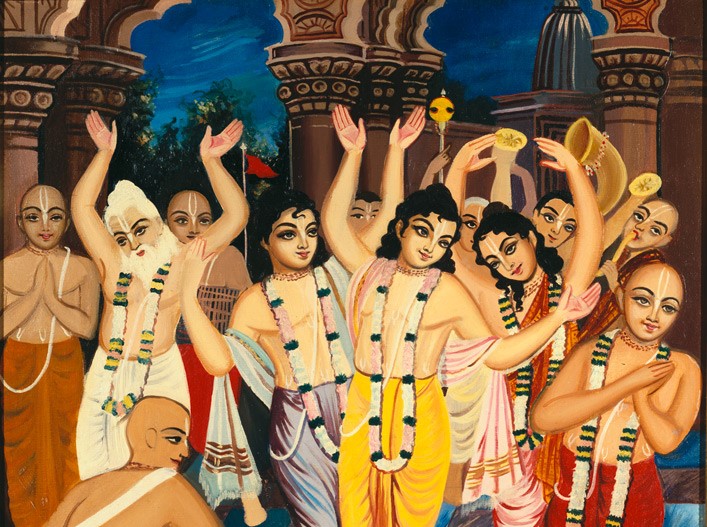
Within the Vedic scriptures we find innumerable detailed descriptions of the glory and power of this chanting process. The Srimad Bhagavatam explains that the Holy Names are so powerful that they can purify us even though we may have no philosophical understanding or belief in their spiritual potency:
As a fire burns dry grass to ashes, so the holy name of the Lord, whether chanted knowingly or unknowingly, burns to ashes, without fail, all the reactions to one’s sinful activities. If a person, unaware of the effective potency of a certain medicine, takes that medicine or is forced to take it, it will act even without his knowledge because its potency does not depend on the patient’s understanding. Similarly, even though one does not know the value of chanting the holy name of the Lord, if one chants knowingly or unknowingly, the chanting will be very effective.
[Srimad Bhagavatam 6:2:18-19]
Because the Lord is all-pure, His holy names have complete power to purify our hearts and will gradually bring us to the point of perfect love for God. Krishna says to Arjuna in the Adi Purana:
Anyone who is engaged in chanting My transcendental name must be considered to be always associating with Me. And I may tell you frankly that for such a devotee I become easily purchased.
[Adi Purana]
In the Padma Purana it is stated:
There is no difference between the holy name of the Lord and the Lord Himself. As such, the holy name is as perfect as the Lord Himself in fullness, purity, and eternity. The holy name is no material sound vibration, nor has it any material contamination.

Haridas Thakur, a great saintly teacher and student of Lord Chaitanya who appeared in India 500 years ago was described as being the namacharya or teacher of the holy name. He wrote:
No knowledge is as pure as the holy name of the Lord. No vow is as powerful as the holy name. No meditation in the world is like the holy name. No philosophy brings a result like the holy name. No renunciation is greater than the holy name. Nothing will ever be equal to the holy name.
[Srila Haridas Thakur: Sri Harinama Chintamani 8:4-6]
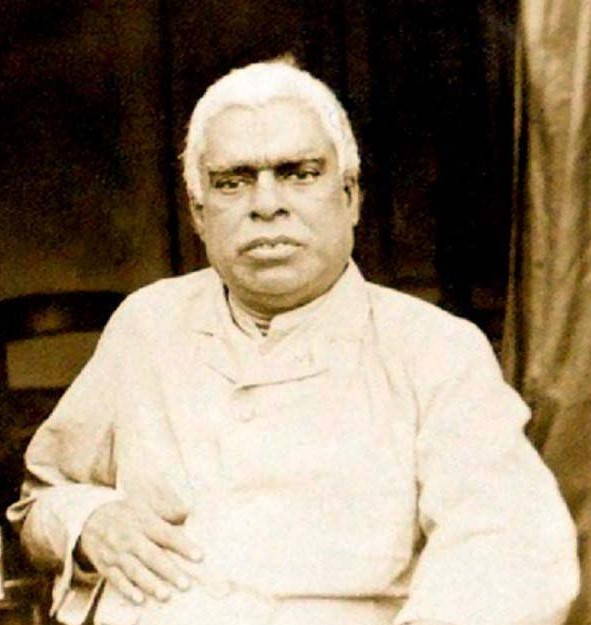
If one sincerely takes shelter of the Holy Names of Krishna by chanting Hare Krishna, he will achieve spiritual perfection within the compass of his normal daily activities
[Srila Bhaktivinoda Thakur]
Lord Chaitanya Himself wrote eight very beautiful prayers which teach us how to redevelop our long-lost relationship with the Supreme Lord. His First Prayer states:
All glories to the congregational chanting and singing of God’s names, which cleanses the heart of all the dust accumulated for years together, and extinguishes the fire of conditional life, of repeated birth and death. This congregational chanting of the names of God is the prime benediction for humanity at large because it spreads the rays of the benediction moon. It is the life of all transcendental knowledge. It increases the ocean of transcendental bliss, and it enables us to fully taste the nectar for which we are always anxious.
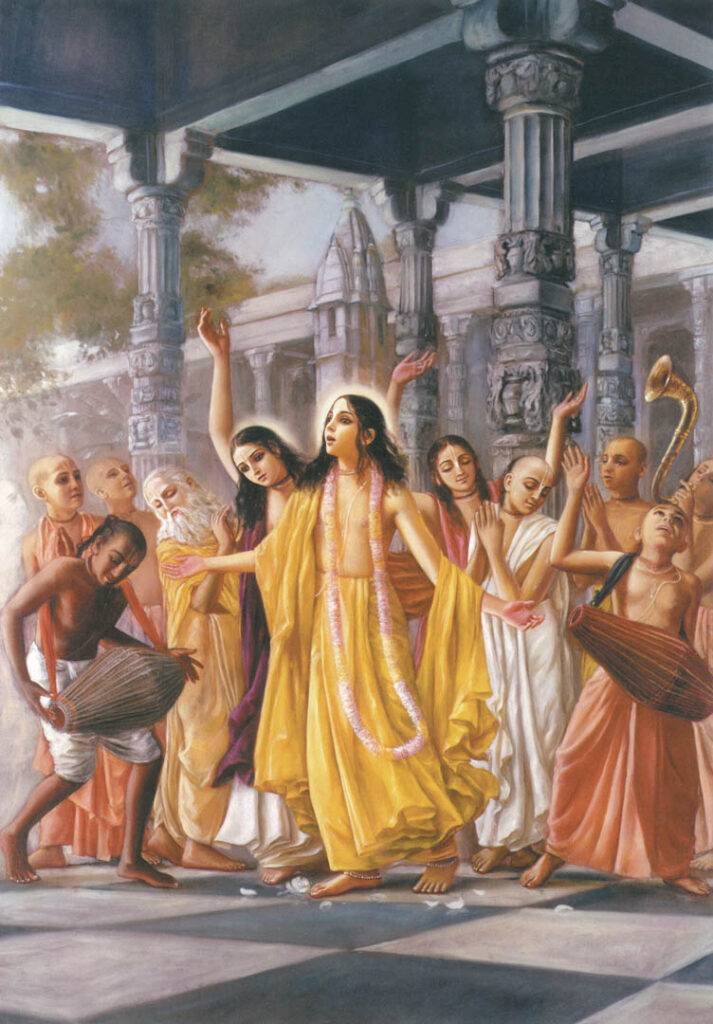


Leave A Reply